Mozambique
Travel to Mozambique and immerse yourself in an enchanting tapestry of color and culture, where the sun-kissed shorelines whisper tales of discovery and adventure. Picture miles of pristine beaches caressed by the gentle rhythms of the Indian Ocean, where the golden sands give way to cerulean waters teeming with vibrant marine life. The scent of fresh seafood grilling on open fires blends with the salty sea breeze, while the distant strains of marimba music invite you to dance under starlit skies. Renowned for its rich history, Mozambique offers a mosaic of colonial architecture and traditional villages, promising a journey filled with discovery and connection. As you travel through this diverse land, let the taste of its fragrant peri-peri-infused dishes awaken your senses, and allow the country's warmth and hospitality to capture your heart. Unravel the beauty of Mozambique—an unforgettable destination that beckons the adventurous at heart who seek travel experiences rooted in culture and natural splendor.
Mozambique Travel Season
Mozambique is a captivating destination for travelers, offering a unique blend of pristine beaches, vibrant culture, and stunning landscapes. The best time to travel to Mozambique largely depends on your preferences for weather, crowd size, and local events. The peak travel season generally falls during the dry months from May to November. During this period, Mozambique's weather is typically warm and sunny, making it ideal for exploring the country's natural beauty. These months coincide with the southern hemisphere's winter, providing milder temperatures that are perfect for outdoor activities.
While May to November is the traditional peak travel season in Mozambique, there are significant advantages to visiting during the shoulder months of April and November. During these times, the weather remains pleasant with less humidity, and there are often fewer tourists, allowing travelers to enjoy popular spots with more tranquility. These quieter months can offer a more relaxed travel experience with better opportunities for interacting with locals and exploring cultural attractions at a leisurely pace.
Local Events and Holidays
Traveling to Mozambique also presents an opportunity to partake in its rich cultural festivals and public holidays. One notable event is the Independence Day celebrations on June 25th, where the country commemorates its independence from Portugal with colorful parades, music, and dance. Another major event is the annual Tambo International Art Camp held in several locations across the country, showcasing local and international art, music, and dance, usually taking place in August. These events provide a unique glimpse into the cultural tapestry of Mozambique.
Off-Peak Perks
The off-peak season, typically from December to March, coincides with the rainy season in Mozambique. While the increased rainfall may deter some travelers, this period brings its own charm and offers distinct advantages. The landscape transforms with lush greenery, and bird enthusiasts may find this an excellent time for birdwatching. Additionally, travelers can often find off-peak travel deals on accommodations and flights, making it a budget-friendly option for exploring Mozambique. Despite the rain, the coastal areas, particularly the Bazaruto and Quirimbas Archipelagos, remain beautiful and can be less crowded, ensuring a more private beach experience.
Ultimately, the best time to travel to Mozambique depends on what travelers are seeking from their adventure. Whether it's basking in the sun on idyllic beaches, exploring vibrant cultural festivities, or benefiting from the perks of off-peak travel, Mozambique offers a diverse range of experiences throughout the year.
The Weather and Seasons in Mozambique
Mozambique boasts a diverse climate that can offer travelers a variety of experiences throughout the year. Located in Southeast Africa, Mozambique enjoys a tropical savannah climate, with distinct wet and dry seasons primarily influenced by the Indian Ocean's monsoon winds. Those planning their travel to Mozambique can expect an enthralling exploration of its weather patterns.
Wet Season in Mozambique
The wet season in Mozambique typically unfolds from November to April, marking a period of increased rainfall and humidity. During this time, temperatures can range from 75°F to 86°F (24°C to 30°C). This season is characterized by high humidity levels and short, intense rain showers, primarily during the afternoon and evening. While the country experiences its heaviest rainfall between January and March, travelers interested in the country's lush, green landscapes might find this time idyllic.
Dry Season in Mozambique
The dry season, spanning May through October, is considered the best time to travel to Mozambique. During these months, the weather is drier and cooler, with temperatures ranging from 57°F to 79°F (14°C to 26°C). This season boasts lower humidity levels, making it an ideal time for outdoor activities and wildlife viewing, as animals gather around water sources. The pleasant weather conditions make it more comfortable for travelers to explore Mozambique's stunning beaches and vibrant national parks.
Subtropical and Coastal Influence
Certain regions of Mozambique, particularly along the coast, display a marine subtropical climate. Travelers visiting the coastal areas can expect warm temperatures and higher humidity year-round, complemented by a caressing ocean breeze. These regions are notably less affected by the extreme temperature fluctuations seen further inland. If your travel to Mozambique includes the coastline, prepare for warmer days and slightly cooler nights accompanied by a constant, refreshing sea breeze.
Notable Seasonal Events
Several significant events in Mozambique are influenced by its seasonal weather patterns. The Praia do Tofo area, renowned for its marine life, offers excellent diving and snorkeling opportunities, especially in the dry season when the visibility is at its best. Mozambique's calendar is also punctuated with cultural festivals and events, often taking place during the drier months when travel conditions are ideal. These local gatherings offer travelers a genuine insight into the rich Mozambican culture and traditions.
Overall, while planning travel to Mozambique, understanding its climate nuances can significantly enhance the experience. Whether opting for the lush green scenery of the wet season or the dry, sunny beaches in the cooler months, Mozambique provides an unforgettable backdrop for any travel itinerary.
Accepted Payment Methods and Other Payment Information in Mozambique
Travel to Mozambique offers a fascinating blend of vibrant culture and natural beauty, and understanding the local payment options can enhance your travel experience. The currency in Mozambique is the Mozambican Metical (MZN), which travelers should become familiar with when making cash transactions. ATMs are widespread, and money can be withdrawn using a variety of banking cards, although it's always wise to carry some local currency while traveling around Mozambique, as smaller vendors and activities in rural areas often only accept cash.
When you travel to Mozambique, you'll find that credit card usage is increasingly accepted, particularly in urban centers and tourist hotspots. Most businesses, including hotels, restaurants, and major retailers, accept Visa and Mastercard. However, acceptance of American Express and Discover cards can be more limited, with only high-end establishments typically allowing their use. Travelers should verify with businesses beforehand to avoid surprises, and it may be prudent to carry alternatives or local currency.
For those embarking on travel to Mozambique, it's useful to know the nuances of cash usage and payment etiquette. Cash remains king especially outside of urban areas. Because of this, it's helpful to have Metical in smaller denominations for markets, street vendors, and smaller establishments. Before your travel to Mozambique, it’s advisable to exchange some currency beforehand or upon arrival at the airport or a local bank, as relying solely on card payments could be restrictive.
Tipping in Mozambique is generally appreciated, although it is not obligatory. In restaurants, a 10% tip is considered generous and is typically expected in more upscale settings. For services such as hotel staff, drivers, and tour guides, small gratuities are a kind gesture. Make sure that the tip is in cash, as it is unlikely to be included in card payments.
When planning travel to Mozambique, it's essential to consider the availability and practicality of different payment methods. While the Mozambican Metical and major credit card brands will serve most of your needs, being prepared for limited card acceptance in rural areas and keeping cash on hand will ensure a smoother travel experience. Understanding and adapting to local payment practices can greatly enhance your appreciation and enjoyment of all that Mozambique has to offer.
Why You Should Travel to Mozambique
Travel to Mozambique and immerse yourself in its breathtaking natural beauty, a feature that makes it a standout destination for globetrotters. Mozambique boasts an expansive coastline stretching over 2,500 kilometers along the Indian Ocean, offering idyllic beaches with white sand and clear turquoise waters. Visitors can enjoy serene views and relaxing atmospheres, making it a perfect stop for beach lovers globally.
Rich Marine Life
Mozambique is a paradise for underwater enthusiasts, making it a sought-after travel destination. The Quirimbas Archipelago and Bazaruto Archipelago are home to vibrant marine life, including dugongs, dolphins, and a splendid array of colorful coral reefs. Diving and snorkeling expeditions here present opportunities to explore one of the richest marine ecosystems in the world.
Cultural Diversity
Travel to Mozambique to experience its rich tapestry of cultural diversity. The nation has a fascinating mix of African, Arab, and Portuguese influences. This intriguing blend is beautifully reflected in the local food, music, and traditional dances. Travelers can indulge in local festivals and markets, offering glimpses into the vibrant cultural mosaic that defines Mozambique.
Limpopo and Gorongosa National Parks
Mozambique is a haven for nature lovers and wildlife enthusiasts. The Limpopo National Park and Gorongosa National Park are essential stops for travelers seeking wildlife encounters. These parks are home to a diversity of wildlife, including elephants, lions, and hippos, making Mozambique a fantastic safari destination.
Ancient Island Ruins
Mozambique Island, a UNESCO World Heritage site, offers a glimpse into the nation's historical past, providing its visitors with a unique travel experience. With fortresses, palatial ruins, and centuries-old churches, the island tells the fascinating story of Mozambique's colonial past, promising a captivating exploration for history buffs.
Gastronomic Delights
Mozambique's cuisine is a delightful journey for the taste buds. The local food scene is a blend of Portuguese, Arab, and African culinary traditions, featuring flavorsome dishes such as piri-piri chicken and fresh seafood. Traveling to Mozambique ensures a deliciously memorable culinary adventure.
Warm and Welcoming Locals
The people of Mozambique are known for their warm hospitality and friendliness, which can enhance any travel experience. Engaging with locals, whether it’s in a bustling market or a calm coastal village, offers travelers a warm sense of connection and belonging, enriching your journey through this beautiful country.
Thrilling Adventure Activities
Mozambique is an excellent destination for thrill-seekers. Travel to Mozambique for an adrenaline-packed adventure offering activities like kite surfing, deep-sea fishing, and sailing. With such a wide range of exhilarating options, travelers can quench their thirst for adventure and create unforgettable memories.
Unspoiled Natural Landscapes
One of Mozambique's most significant assets is its untouched natural landscapes, which provide travelers with pristine settings perfect for exploration. From sprawling savannas to lush mangroves and remote islands, the country's diverse geography offers countless opportunities for ecological tourism and nature photography.
Vibrant Arts Scene
Finding a vibrant arts scene in Mozambique is easy and engaging. The nation’s cities, particularly Maputo, are hubs for Mozambican contemporary art, music, and dance. Travelers can visit art galleries, listen to live performances of Marrabenta music, and discover the craftsmanship of local artisans to experience Mozambique’s creative spirit.
The History of Mozambique
Travel to Mozambique offers history enthusiasts a journey into a land imbued with a rich tapestry of past events and cultural evolution. Located in Southeast Africa, Mozambique's history begins long before colonial times, with its early inhabitants being Bantu-speaking peoples. Over the centuries, Mozambique has witnessed a remarkable evolution, shaped by the influence of Arab traders, Portuguese explorers, and local kingdoms. This blend of influences has left an indelible mark on the nation's cultural and historical landscape, which makes travel here an alluring prospect for anyone interested in the profound interplay of different cultures over time.
Mozambique, with its strategic location along the Indian Ocean, was a significant trading hub from the 9th century onwards, connecting Africa to the wider world. During travel to Mozambique, one cannot miss the Ilha de Moçambique, a UNESCO World Heritage Site, which served as the capital for nearly four centuries. This small yet significant island is dotted with remnants of colonial architecture, including the Chapel of Nossa Senhora de Baluarte, reputed to be the oldest European building in the Southern Hemisphere, constructed in 1522. These landmarks serve as silent witnesses to the past, offering insight into the era when the Portuguese first established their Asian sea route.
The historical narrative of Mozambique underwent a seismic shift in the 20th century, with the country emerging from colonial rule to become an independent nation in 1975, following a decade-long liberation struggle. This period deeply influenced Mozambique’s national identity, making it a unique travel destination for those interested in post-colonial history. Sites such as the Fortaleza of Maputo offer travelers a glimpse into the colonial past and the fortified structures that played pivotal roles during times of conflict. The fort's museum showcases artifacts from these defining chapters of Mozambican history, inviting visitors to delve into tales of resilience and rebirth.
In addition to its historical sites, Mozambique's vibrant cities and towns boast a rich cultural heritage that can be seen in its art, music, and traditions. The country is renowned for its diverse cultural expressions, from the traditional dances of the Makonde to the melodious sounds of marrabenta music. Travel to Mozambique means embracing a unique cultural experience in which locals celebrate their heritage through colorful festivals and traditional ceremonies. This authenticity, coupled with the country's compelling history, makes Mozambique a captivating destination for travelers seeking to immerse themselves in the stories and rites of a nation that has risen from its historical challenges with grace and strength.
The Culture of Mozambique
Mozambique, with its breathtaking landscapes and vibrant traditions, is a destination that captivates travelers from around the world. When you travel to Mozambique, you are greeted by a tapestry of cultures woven together by centuries of history. The countries cultural blend is shaped by Bantu, Arab, Indian, and Portuguese influences, making Mozambique a fascinating mosaic of people and traditions. This unique composition is reflected in the people of Mozambique, who are known for their warmth and hospitality. Whether you are strolling the streets of Maputo or exploring the rural villages, you will encounter a welcoming spirit that is at the heart of life in Mozambique.
Traveling through this diverse country will reveal a rich array of local traditions and festivals. One of the most vibrant festivals is the Maputo International Music Festival, which showcases the country's love for music and dance. The festival brings together local and international artists, celebrating Mozambique’s diverse musical heritage. In the north, the Nampula Festival is another significant event that highlights traditional dances like the Makonde dances. These cultural celebrations are not just entertainment—they are an important means of preserving Mozambique’s rich history and traditions. Witnessing these events in person offers travelers an authentic glimpse into the soul of Mozambique.
Daily customs in Mozambique are deeply rooted in community and family life. Markets are bustling hubs of social interaction where people come together to buy, sell, and share stories. Mozambicans express their warmth and camaraderie through open-air markets where fresh produce, handmade goods, and local crafts abound. This emphasis on community is also reflected in the country’s culinary practices. Sharing meals made with love and care is a daily tradition, often involving popular dishes like Matapa, a flavorful dish made from cassava leaves, and Piri Piri chicken, a flavorful nod to Portuguese influence. Travelers to Mozambique often find that these shared meals are a highlight of their visit.
Art, music, and dance are dynamic expressions of Mozambique’s cultural identity. Mozambican art, characterized by its vibrant colors and intricate designs, can be seen in the form of Makonde sculptures and batik cloth. Music is equally diverse, ranging from traditional African rhythms to influences from Portuguese fado and Brazilian samba. The rhythms of marrabenta and the melodies of timbila, a type of xylophone indigenous to the Chopi people, highlight the country’s creativity and cultural resilience. This artful expression underscores efforts to preserve indigenous cultures and traditions, making travel to Mozambique an enriching experience for those looking to explore a nation steeped in history and artistry.
The Culinary Experience of Mozambique
When travelers embark on a journey to Mozambique, they are greeted with a culinary experience as vibrant and diverse as the country's scenic landscapes and cultural richness. Mozambique's cuisine is a tantalizing fusion of African, Portuguese, Indian, and Arab influences, reflecting its complex history and the varied cultural communities that make up its population. The country's coastal geography ensures that seafood is a staple of the local diet, delighting visitors with fresh ocean flavors that are both simple and richly spiced. Prawns, crayfish, and a variety of fish are often marinated in a fiery peri-peri sauce, a legacy of Portuguese colonial presence, and grilled to perfection. The use of fresh coconuts, cassava, and maize underscores many dishes, offering a comforting complement to the spicy and savory flavors that dominate the cuisine.
Travelers to Mozambique should not miss the opportunity to try some of the nation's must-try dishes. Matapa, made from ground cassava leaves and cooked with coconut milk and peanuts, is a local favorite that embodies the earthy flavors of Mozambican food. Another essential experience is savoring Xima, a soft porridge-like dish often served as a side to stews or grilled meats. For those with a sweet tooth, bolo polana—a dessert comprising cashew nuts, mashed potatoes, and sugar—reflects the inventive use of native ingredients in Mozambican desserts. Beverages such as Laurentina and 2M beers offer a refreshing accompaniment to meals and provide a taste of Mozambique's brewing scene. Ranging in style and flavor, these local brews offer insight into regional tastes and are integral to a comprehensive culinary exploration.
Dining in Mozambique spans from vibrant street food scenes to elegant fine dining establishments, offering diverse experiences for every traveler. The bustling markets of Maputo, the capital city, present an authentic opportunity to immerse in the local way of life. Vendors line the streets with stalls brimming with everything from grilled corn and samosas to freshly blended fruit juices. These markets are a must-visit for those wanting to dive into the heart of Mozambique's culinary heritage. Fine dining in Mozambique often incorporates high-end interpretations of traditional flavors, providing a sophisticated experience that still nods to the country's rich cultural tapestry. Restaurants along the coastline often blend breathtaking views with gourmet meals, ensuring that dining is a feast for the senses.
Culinary traditions in Mozambique echo the nation's customs and seasonality, with food festivals celebrating local produce and traditional cooking methods. One notable event is the annual Tofu Festival, held to honor Tofu Beach's vibrant seafood culture, bringing together locals and travelers to celebrate with music, dance, and of course, an array of seafood dishes. Mozambique also caters to various dietary needs, with many restaurants and food markets offering vegan and vegetarian options. Dishes such as coconut-based curries or fresh salads with indigenous vegetables provide delicious choices for those with specific dietary preferences. Travel to Mozambique not only entices with its breathtaking landscapes but also promises a flavorful adventure through its rich culinary traditions, offering an unforgettable feast for the palate.
What to See and Do in Mozambique
Mozambique, a gem in southeastern Africa, offers an unparalleled travel adventure with its stunning landscapes, rich culture, and pristine beaches. For the adventurous traveler seeking new destinations, Mozambique is an enticing prospect. To truly appreciate this vibrant country, here are some highlights for every discerning traveler.
Exploring the Vibrant Capital of Maputo
Travel to Mozambique's bustling capital, Maputo, to witness a lively blend of cultures and architecture. Stroll along Avenida Julius Nyerere to explore cafes and boutiques, and don't miss the architectural wonder of the Maputo Railway Station. Designed by Gustave Eiffel, this station is a masterpiece of colonial heritage. The Maputo Central Market is another must, offering exotic spices and local crafts. For families, the Natural History Museum provides an educational deep dive into the region's unique fauna.
Diving in the Quirimbas Archipelago
Adventure seekers traveling to Mozambique will find their paradise in the Quirimbas Archipelago. Comprising over 30 islands, this region offers exceptional diving and snorkeling opportunities amidst vibrant coral reefs. Quirimbas National Park, where marine life flourishes, is an explorer’s dream. Untouched beaches and rustic fishing villages provide a glimpse into Mozambican island life. With options for sailing expeditions, this destination is perfect for both sea lovers and those yearning for tranquility.
Paddling the Clear Waters of Lake Niassa
For a serene escape, travel to Lake Niassa, also known as Lake Malawi. Its crystal-clear waters are ideal for kayaking and swimming. With the backdrop of the mountains, Lake Niassa appeals to solo travelers and families alike seeking relaxation amidst nature's beauty. The surrounding villages offer cultural interactions, where travelers can learn about local customs and savor freshly caught fish from the lake.
Immersing in the Mystique of Mozambique Island
Mozambique Island, a UNESCO World Heritage site, offers a journey back in time. This island, once a major trading post, showcases a captivating blend of African, Arab, and Portuguese influences. The imposing Fort São Sebastião stands as a testament to its historical significance. For history buffs and cultural travelers, walking tours provide enlightening narratives of the island's past. The island's diverse architecture and friendly locals make it an unmissable highlight in travel to Mozambique.
Safari Adventures in Gorongosa National Park
No travel to Mozambique is complete without experiencing the remarkable wildlife of Gorongosa National Park. Known for its resilient revival story, the park offers safari experiences that rival neighboring countries. Spotting lions, elephants, and diverse bird species in their natural habitat is an exhilarating experience for families and solo travelers alike. Guided tours enhance understanding of conservation efforts, making a visit to Gorongosa both thrilling and enlightening.
Unwinding on the Beaches of Tofo
Tofo, a picturesque coastal town, invites travelers to enjoy its laid-back beach vibe. This spot is famous for its excellent surfing conditions and abundant marine life, including the majestic whale shark and playful dolphins. Diving and snorkeling excursions provide memorable underwater encounters. Perfect for families and solo adventurers, Tofo's vibrant nightlife and beachside cafes offer relaxation along with lively local music.
Cultural Enrichment at Ilha de Moçambique
Travel to Mozambique reveals its deep cultural roots at Ilha de Moçambique. As the former capital, it offers historical richness through its colonial buildings and cultural museums. Stroll through narrow streets while observing traditional craftsmanship in local markets. The island's penchant for cultural festivals provides a chance for travelers to immerse themselves in traditional music and dances. This destination is ideal for cultural enthusiasts eager to engage with Mozambique's historic legacy.
The Spectacular Bazaruto Archipelago
Bazaruto Archipelago, a sanctuary for luxury travelers, is renowned for its stunning turquoise waters and powdery white sands. Snorkeling in the vibrant reefs among a variety of marine species is an unforgettable experience. The luxury lodges available offer top-notch services while maintaining harmony with the pristine environment. Bazaruto is perfect for those seeking a romantic retreat or an indulgent beach holiday, making travel to Mozambique truly exceptional.
A Tantalizing Culinary Journey
Mozambique's cuisine is a delightful fusion of African and Portuguese flavors, offering travelers an exquisite culinary experience. Peri-peri prawns, matapa, and the staple xima are must-try dishes. Local restaurants, particularly in Maputo, serve these delicacies with a side of traditional music, enhancing the dining experience. Culinary tours and cooking classes provide hands-on opportunities to master these flavors, making it a rewarding experience for food lovers exploring Mozambique.
Adrenaline-Rush Activities in Ponta do Ouro
Ponta do Ouro is an adventure hotspot for travelers seeking thrilling activities. Situated near the South African border, this charming town offers scuba diving, dolphin encounters, and deep-sea fishing. The wilderness trails available for horseback riding add an extra thrill for explorers. As the sun sets, the vibrant nightlife ensures that the adventure continues off the sandy shores. This destination is ideal for adrenaline enthusiasts traveling to Mozambique.
Tips & Tricks for Traveling in Mozambique
When planning to travel to Mozambique, one should keep in mind its unique blend of cultures, scenic beauty, and vibrant traditions. Here are ten practical tips to help enrich your travel experience in Mozambique, making it more enjoyable and immersive.
Embrace Local Cuisine
Mozambique offers a rich culinary experience shaped by African, Portuguese, and Indian influences. When you travel to Mozambique, make it a point to try local dishes such as peri-peri chicken, matapa, and fresh seafood like prawns and crayfish. Street food stalls and local markets are perfect for sampling authentic Mozambican flavors while interacting with residents for a genuine cultural experience. Don't forget to try cassava bread and the fresh coconut water available across the country.
Understand and Respect Local Customs
Familiarize yourself with Mozambique's cultural norms and etiquette, as this will enhance your interactions with locals. Mozambicans value greetings, so always start with a friendly "Bom dia" (Good morning) or "Boa tarde" (Good afternoon). Dress modestly, especially in rural areas and religious sites. Demonstrating respect for local traditions and values will go a long way in making your travel to Mozambique more welcoming.
Navigate Public Transportation Wisely
While Mozambique's public transportation, such as buses and chapa minibuses, is affordable, they can be crowded and inconsistent. If you prefer comfort and reliability, consider hiring a private taxi or renting a car. For solo travelers, the bustling chapa experience can be adventurous, offering a glimpse into the daily lives of Mozambicans. Plan your route in advance, and be prepared for any delays to enjoy your travel to Mozambique.
Stay Safe by Following Guidelines
Although Mozambique is generally safe for travelers, it's important to remain vigilant, especially in urban areas like Maputo. Avoid walking alone at night, secure your valuables, and use only registered taxis or trusted transportation methods. If you're traveling to remote areas, inform someone of your plans and ensure you have communication access in case of emergencies. Check local advisories before embarking on your travel to Mozambique to ensure a safe journey.
Plan for Seasonal Weather Changes
Mozambique experiences a tropical climate with a rainy season from November to April and a dry season from May to October. The best time to travel to Mozambique is during the dry months when temperatures are more moderate, and roads are passable. Photographers will appreciate the vibrant landscapes and wildlife during this period for capturing stunning images of Mozambique’s beauty.
Budget for Both Cash and Card Transactions
While major cities and tourist hotspots accept credit cards, cash is king in many parts of Mozambique. Ensure you have enough local currency (Metical) for small purchases, especially in rural areas and local markets where card facilities might not be available. ATMs are widely available in urban areas, but it's wise to carry some dollars for emergencies when you travel to Mozambique.
Avoid Crowds by Exploring Off-the-Beaten-Path Destinations
Though Mozambique boasts popular destinations like Maputo and Tofo Beach, explore lesser-known gems for a more serene experience. The Quirimbas Archipelago and Gorongosa National Park offer stunning landscapes and wildlife without the hustle of tourist crowds. Travel to Mozambique's rural provinces, such as Inhambane or Niassa, for a quieter and immersive cultural experience.
Engage with Mozambican History and Arts
Enhance your travel to Mozambique by diving into its rich history and artistic heritage. Visit the National Art Museum in Maputo for exhibits on contemporary and traditional Mozambican art. To understand the country's past, take guided tours of historic sites like Fortaleza de Maputo and the Ilha de Moçambique. This will provide deeper insights into Mozambique's cultural and historical landscape.
Prepare for Limited Internet Connectivity
While internet access is improving, connectivity can be unreliable outside major urban centers in Mozambique. Consider purchasing a local SIM card for mobile data access if you need consistent internet for navigation or keeping in touch with family. Download essential information and maps before traveling to remote areas to ensure you're prepared during your travel to Mozambique.
Support Local and Sustainable Tourism
Contribute to Mozambique's economy by supporting local artisans and businesses during your travels. Purchase handcrafted souvenirs and dine at local restaurants to positively impact communities. Consider eco-friendly accommodations and tours that promote conservation and minimize environmental impact. This approach not only enriches your travel experience but also ensures that the natural and cultural wealth of Mozambique is preserved for future visitors.
What To Know Before You Go to Mozambique
Traveling to Mozambique offers a unique blend of cultural richness and natural beauty, but there are several important aspects travelers should be aware of to ensure a smooth journey. One of the foremost considerations is understanding the entry requirements. Most visitors will need a visa to enter Mozambique, which can often be obtained at the airport or border post, but it's recommended to apply in advance through the Mozambican embassy or consulate in your country for peace of mind. Ensure your passport is valid for at least six months beyond your intended departure date.
Health Precautions and Vaccinations
Health precautions are crucial when you travel to Mozambique. The country is in a region where malaria is prevalent, so it is advisable to take antimalarial medication and use mosquito repellents. Vaccinations for hepatitis A, hepatitis B, typhoid, and cholera are recommended, along with an up-to-date routine vaccination schedule. Yellow fever vaccine proof is required if you're coming from a country with a risk of yellow fever. Comprehensive travel insurance is strongly recommended to cover any potential medical expenses or emergency evacuations.
Understanding Local Customs and Etiquette
Respecting local customs and etiquette is essential during your travel to Mozambique. The country is religiously diverse, with significant Christian and Muslim populations. Dress modestly, especially in rural areas and places of worship. Handshakes are a common form of greeting. Showing respect to elders and seeking permission before taking photographs of individuals are generally appreciated gestures.
Transportation Options
Navigating Mozambique's vast landscapes requires understanding local transportation options. In urban areas, taxis are common, often not metered, so agree on a fare before setting off. For longer distances, buses offer an economical choice, although they may not always run on a strict timetable. Renting a car is another option, but be cautious of road conditions, especially during the rainy season.
Tipping Culture
Tipping in Mozambique is appreciated but not obligatory. In restaurants, a tip of about 5-10% is customary for good service. For hotel staff, small tips for housekeeping or luggage assistance are well received. When using taxi services, you might round up the fare as a form of gratuity.
Language and Communication
Portuguese is the official language of Mozambique, and while English is spoken in some tourist areas, learning a few common phrases in Portuguese can enhance your experience. Simple greetings such as "Bom dia" (Good morning) and "Obrigado/a" (Thank you) are useful. If you're unfamiliar with the language, carrying a phrasebook or using a translation app can be helpful in communicating more complex needs.
Accessibility in Mozambique
Travel to Mozambique offers a rich tapestry of culture, wildlife, and stunning beaches, attracting adventurers and vacationers alike. However, when considering accessibility, it's crucial to understand the current infrastructure and services available for travelers with specific needs. This guide focuses on the accessibility landscape for travelers who may have physical, visual, or auditory needs while visiting Mozambique.
Physical Accessibility in Mozambique
For travelers with limited mobility or those using wheelchairs, travel in Mozambique presents a mix of challenges and opportunities. While major cities such as Maputo and Beira are making strides to improve infrastructure, the country as a whole is still developing in terms of accessibility. Sidewalks may not always be wheelchair-friendly, and it can be difficult to find ramps and elevators in many public and private buildings. However, some high-end hotels and resorts in Mozambique have begun to offer more accessible amenities like wheelchair ramps, specially designed rooms, and accessible bathroom facilities. It is advisable for travelers to communicate directly with accommodations before arrival to ensure that their needs can be met.
Accessible Public Transportation in Mozambique
Public transportation in Mozambique, including buses and taxis, generally lacks comprehensive accessibility features. Most public buses do not accommodate wheelchair users effectively, and taxis may require negotiation with drivers to ensure adequate service. Renting a private vehicle with a driver experienced in assisting travelers with mobility needs could be a viable alternative. Some travel agencies offer customized tours and services for those requiring additional support, making travel around Mozambique more accessible.
Visual and Auditory Accommodations
For travelers with visual or auditory needs, the provision of specialized services in Mozambique is limited. Few establishments offer braille menus or auditory assistance systems. However, modern communication devices can bridge some of these gaps, and it is often valuable to have a travel companion or guide. Tourist information centers and some upscale hotel staff may offer support to facilitate smoother experiences for those needing assistance.
Accessible Tourist Attractions in Mozambique
Mozambique's natural attractions, such as its beautiful beaches and stunning national parks, remain its main draw. Several beach resorts, particularly in areas like Vilankulo, offer partially accessible experiences, with some having adapted paths and viewpoints. The Bazaruto Archipelago, though largely untouched, provides accessible boat options that can accommodate various mobility needs. While wildlife reserves like Gorongosa National Park are characterized by rugged terrain, some safari providers are beginning to offer more inclusive experiences, allowing all travelers to enjoy Mozambique's incredible biodiversity.
While Travel to Mozambique presents certain challenges for accessibility, ongoing improvements indicate a positive trend. Travelers should proactively communicate their needs with providers and leverage local expertise to maximize their experience in this captivating African destination. As awareness and infrastructure improve, Mozambique holds the potential to become a more inclusive travel destination for everyone.
Health & Safety in Mozambique
Traveling to Mozambique offers a unique opportunity to explore its beautiful landscapes and vibrant culture. However, there are several safety concerns that travelers should be aware of to ensure a secure and enjoyable journey. From water safety to crime and health precautions, being informed can significantly enhance your travel experience.
Water Safety
Mozambique is renowned for its stunning coastline, but travelers must exercise caution when it comes to water safety. The ocean currents can be strong, and not all beaches have lifeguards. It is advised to swim only in designated areas and to avoid swimming alone. Additionally, tap water in Mozambique is not always safe to drink, so it's recommended to consume bottled water to avoid waterborne illnesses.
Natural Disaster Risks
Mozambique is occasionally affected by natural disasters such as cyclones and floods, particularly during the rainy season from November to April. Travelers should stay updated with local weather forecasts and heed any advisories or warnings issued by local authorities. Having a preparedness plan for emergencies can be crucial.
Crime
Crime, including petty theft and pickpocketing, is a concern in some areas of Mozambique, especially in urban centers like Maputo and Beira. Travelers should remain vigilant, avoid displaying valuables, and be cautious in crowded places. It's advisable to use reputable transportation services and stay in well-known accommodations to reduce risks. Keep copies of important documents, such as your passport, in case of theft.
Political and Social Unrest
While Mozambique generally enjoys political stability, travelers should be aware of the potential for localized demonstrations or unrest. Staying informed about the current political climate and avoiding large gatherings or protests can help ensure personal safety. Registering with your embassy upon arrival can be beneficial in case of emergencies.
Health and Safety Precautions
Travelers to Mozambique should take several health precautions, including staying updated with recommended vaccinations. Vaccines for diseases such as hepatitis A, hepatitis B, typhoid, and yellow fever are recommended. Malaria is prevalent, so appropriate antimalarial medications and preventive measures, such as using mosquito repellent and sleeping under mosquito nets, are essential.
Access to healthcare in Mozambique can vary, with more comprehensive facilities located in urban areas. Travelers are advised to carry a basic first aid kit and any personal medications they may need. Health insurance that covers medical evacuation is recommended, as medical facilities may be limited in remote areas.
Being aware of these safety concerns and taking appropriate precautions can ensure that your travel to Mozambique is both safe and enjoyable. Prioritizing safety allows for a more immersive experience in this captivating country.
Other Places You Might Like
Zanzibar, Tanzania - For those enchanted by the coastline of Mozambique, Zanzibar offers a parallel aquatic paradise. The island boasts an exquisite combination of white sandy beaches and the crystal-clear waters of the Indian Ocean. Travelers can dive into vibrant coral reefs or take a leisurely stroll through the historical Stone Town, a UNESCO World Heritage Site filled with Swahili charm. The culture of Zanzibar, much like that of Mozambique, mixes African, Arabian, and European influences, delivering a rich tapestry of sounds, tastes, and experiences.
Tofo Beach, Mozambique - Travel enthusiasts who adore Mozambique will find Tofo Beach a dream locale. With its extensive stretch of sandy shoreline and vibrant marine life, it mirrors the beauty that initially draws people to Mozambique. Tofo Beach is a hub for diving enthusiasts eager to explore some of the world's most biodiverse underwater ecosystems. The region's laid-back vibe and local culinary delights provide a blend of relaxation and adventure, much like the broader experience of traveling to Mozambique.
Quirimbas Archipelago, Mozambique - Traveling to Mozambique is incomplete without embracing the allure of the Quirimbas Archipelago. This string of islands along Mozambique's northern coast captivates with its untouched coral reefs and sprawling mangrove forests. The archipelago's secluded beaches provide an idyllic escape for those who cherish tranquility amid nature, offering an experience akin to stepping into a picturesque postcard. Visits to Quirimbas echo the adventurous and serene aspects of travel to Mozambique, appealing to travelers who appreciate both luxury and authenticity.
Kruger National Park, South Africa - A short journey from Mozambique’s border reveals the world-famous Kruger National Park in South Africa. Mozambique lovers drawn by wildlife and natural landscapes will find Kruger’s rich tapestry of biodiversity compelling. Known for its significant populations of Africa's Big Five, the park offers an unrivaled safari experience. The transition from Mozambique’s coastal beauty to Kruger's vast savannas presents travelers with a well-rounded journey through Southern Africa's diverse ecosystems.
Victoria Falls, Zambia/Zimbabwe - Just beyond Mozambique’s western bounds, Victoria Falls captivates travelers with its immense scale and breathtaking beauty. Recognized as one of the world's largest waterfalls, its thundering cascades offer a powerful contrast to Mozambique's serene beaches. Visitors can engage in thrilling activities such as bungee jumping, hiking, or a more serene exploration of the surrounding rainforest. Those who travel to Mozambique and delight in its dramatic landscapes will find Victoria Falls equally exhilarating.
Seychelles - Encompassing a different rhythm but sharing the Indian Ocean's allure, Seychelles extends an invitation to those infatuated with Mozambique's maritime charm. The islands are famed for their pristine beaches, lush vegetation, and crystal-clear waters that are ideal for snorkeling and diving. With its emphasis on ecotourism and its commitment to preserving its natural beauty, Seychelles offers Mozambique enthusiasts a similar experience of intimate encounters with wildlife and spectacular coastal views.
Chobe National Park, Botswana - For travelers passionate about both Mozambique's scenic beauty and its wildlife, Chobe National Park is a must-visit. Known for its elephants and riverfront vistas, Chobe provides a safari experience focused on vast herds of wildlife. The Chobe River’s sunsets reflect the same tranquility one finds along Mozambique's shores, while game drives and river cruises offer unique perspectives on the lush African wilderness, rewarding visitors with unforgettable travel memories.
Final Thoughts
Mozambique is a vibrant tapestry of natural beauty and rich culture, making it an ideal destination for anyone seeking an unforgettable escape. When you travel to Mozambique, you’ll discover pristine beaches along its extensive coastline, offering unrivaled opportunities for relaxation and adventure. The warm, turquoise waters of the Indian Ocean beckon with spectacular reefs and diverse marine life, which are perfect for snorkeling and diving enthusiasts. Equally captivating is the Gorongosa National Park, where nature lovers can experience remarkable safari adventures amidst the park's lush landscapes and thriving wildlife.
Beyond its stunning natural attractions, Mozambique offers a cultural journey brimming with unique traditions and a hospitable spirit. The lively markets, rhythmic beats of traditional music, and delicious cuisine rich with Portuguese and African influences provide a delightful immersion into a diverse culture that is as fascinating as it is welcoming. As an emerging travel destination, Mozambique promises authentic experiences free from the crowds, allowing for personal connections and lasting memories. It's a place where adventure, tranquility, and cultural discovery seamlessly come together, urging travelers to embark on a journey that is both meaningful and exhilarating. Consider Mozambique for your next travel destination and let its untamed beauty and vibrant culture leave an indelible mark on your wanderlust-filled heart.
Cyclone Gezani Madagascar Travel Disruptions

Portugal Long Haul Flights Get TAP Premium Economy

Security Risks Sahel And West Africa Overland Travel

2028 World Cruise From Miami To Athens With Azamara

UAE Africa Tourism Plan To Fund $6 Billion Projects

Regional Airline Cancellations Hit African Hubs

Flight delays and airport impacts: October 8, 2025

Aman Karingani to debut in Mozambique's Karingani Reserve
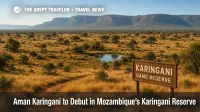
Mozambique Lowers Advisory, but Northern Hotspots Persist

Intrepid Travel Mystery Tour Promises 14-Day African Adventure
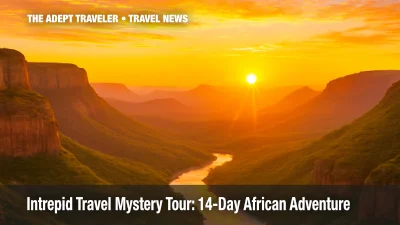
How The Gambia Is Turning Trails and River Cruises into a Model of Sustainable Tourism

Africa Emerges as Top Destination for Adventure Tourism
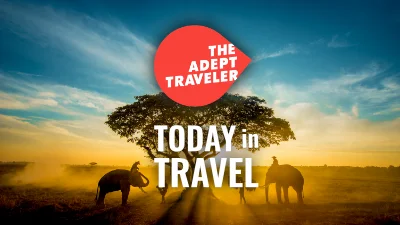
Seabourn's New Luxury Land Excursions for Africa Voyage
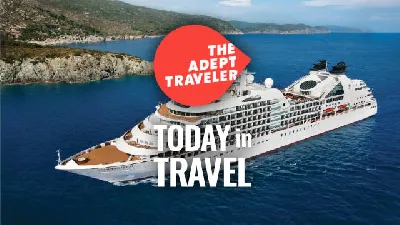
Princess Cruises Reroutes 2025 Voyages Away from Red Sea
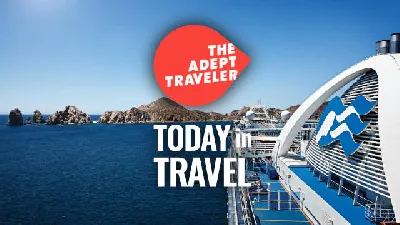
Seabourn's Grand Africa Voyage: A 90-Day Adventure Around the Continent
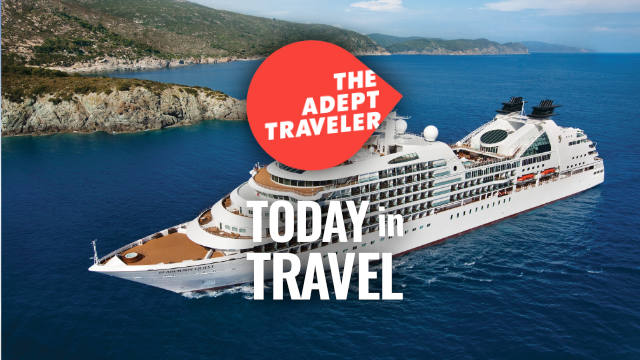
Discover the Ultimate Luxury Cruise in Africa, Vegas Hotel Transformation & Juneau Cruise Control
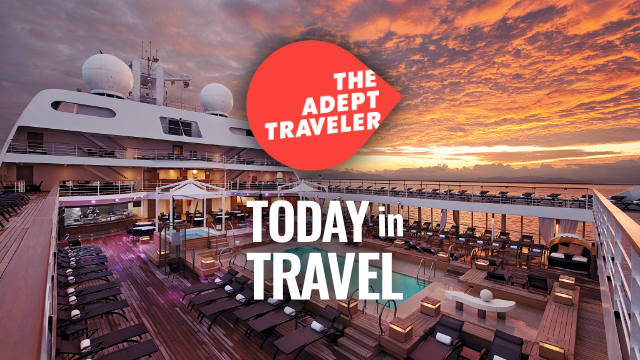
Regent Seven Seas Cruises Unveils New Grand Voyages for 2025 and 2026
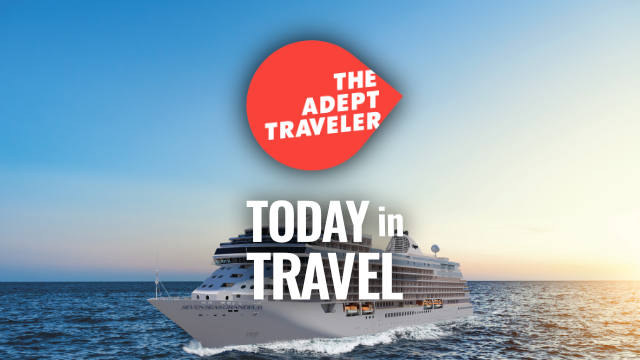
Travel News: Disabled Travel, Safari's, and Australian Cruises

Travel News: Oceania, Uniworld, and Wyndham

